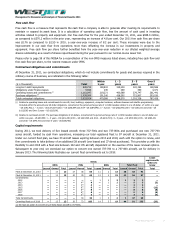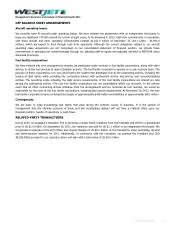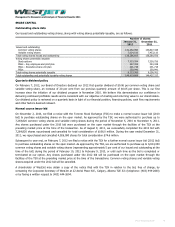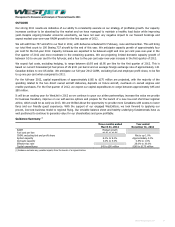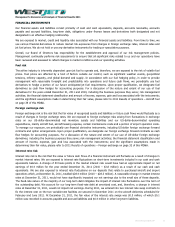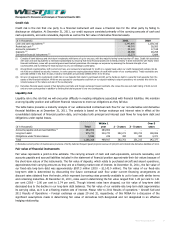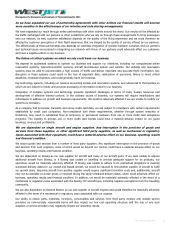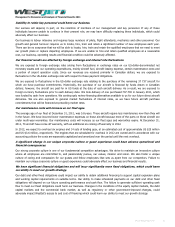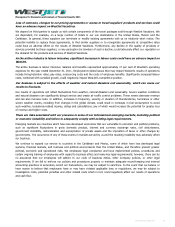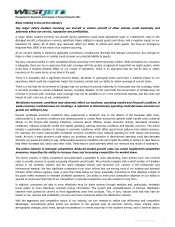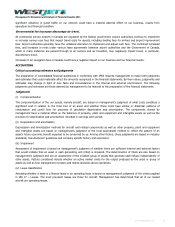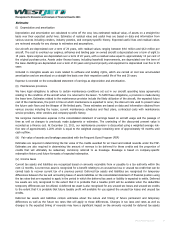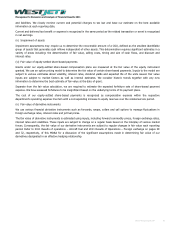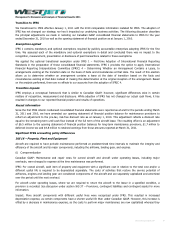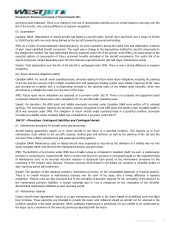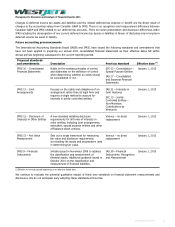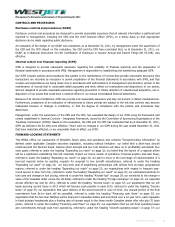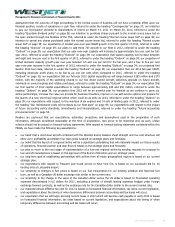Westjet 2011 Annual Report Download - page 46
Download and view the complete annual report
Please find page 46 of the 2011 Westjet annual report below. You can navigate through the pages in the report by either clicking on the pages listed below, or by using the keyword search tool below to find specific information within the annual report.
Management’s Discussion and Analysis of Financial Results 2011
│
Risks relating to the airline industry
Any major safety incident involving our aircraft or similar aircraft of other airlines could materially and
adversely affect our service, reputation and profitability.
A major safety incident involving our aircraft during operations could cause substantial repair or replacement costs to the
damaged aircraft, a disruption in service, significant claims relating to injured guests and others, and a negative impact on our
reputation for safety, all of which may adversely affect our ability to attract and retain guests. We have an Emergency
Response Plan (ERP) in the event of an incident occurring.
An air carrier’s liability is limited by applicable conventions, including the Montreal and Warsaw Conventions. Any changes to
these or other conventions or treaties could increase our potential liability to guests.
We carry insurance similar to other scheduled airlines operating in the North American market. While we believe our insurance
is adequate, there can be no assurance that such coverage will fully protect us against all losses that we might sustain, which
could have a material adverse effect on our results of operations. There is no assurance that we will be able to obtain
insurance on the same terms as we have in the past.
There is a possibility that a significant terrorist attack, pandemic or geological event could have a material impact on our
operations, which could also negatively impact the insurance market and our ability to obtain coverage at current terms.
There is a risk that the Government of Canada may not continue to provide indemnity for third party war risk coverage, which
it currently provides to certain scheduled carriers, including WestJet. In the event that the Government of Canada does not
continue to provide such coverage, such coverage may not be available to us in the commercial markets, and the costs and
impact of such costs are, as yet, undetermined.
Worldwide economic conditions may adversely affect our business, operating results and financial condition. A
weak economy could decrease our bookings. A reduction in discretionary spending could decrease amounts our
guests are willing to pay.
General worldwide economic conditions have experienced a downturn due to the effects of the European debt crisis,
unfavourable U.S. economic conditions and slowing growth in certain Asian economies, general credit market crisis, collateral
effects on the finance and banking industries, concerns about inflation, slower economic activity, decreased consumer
confidence, reduced corporate profits and capital spending, adverse business conditions and liquidity concerns. The airline
industry is particularly sensitive to changes in economic conditions, which affect guest travel patterns and related revenues.
For example, the recent unfavourable worldwide economic conditions have reduced spending for both leisure and business
travel. As such, a weak economy could reduce our bookings, and a reduction in discretionary spending could also decrease
amounts our guests are willing to pay. Unfavourable economic conditions can also impact the ability of airlines to raise fares to
help offset increased fuel, labour and other costs. These factors could adversely affect our revenues and results of operations.
The airline industry is intensely competitive. Reduced market growth rates can create heightened competitive
pressures, impacting the ability to increase fares and increasing competition for market share.
The airline industry is highly competitive and particularly susceptible to price discounting, since airlines incur only nominal
costs to provide services to guests occupying otherwise unsold seats. We primarily compete with a small number of Canadian
airlines in our domestic market, and the same Canadian airlines and numerous U.S. carriers in the transborder and
international markets. We face significant competition from other airlines that are serving most of our existing and potential
markets. Other airlines regularly meet or price their fares below our fares, potentially preventing us from attaining a share of
the guest traffic necessary to maintain profitable operations. Our ability to meet price competition depends on our ability to
operate at costs lower than that of our competitors or potential competitors over the medium to long term.
In addition, consumers are able to more effectively shop for travel services through websites and, particularly, wholesale
travel sellers to more effectively compare pricing information. The growth and competitiveness of Internet distribution
channels have pushed air carriers to more aggressively price their products. This, in turn, reduces yield and may have an
impact on our revenue and profitability, as more and more consumers utilize this distribution network.
With the aggressive and competitive nature of our industry, we turn inwards to realize cost efficiencies and competitive
advantages. Conventional airline profits are sensitive to the general level of economic activity, taxes, interest rates,
demographic changes, price levels, special circumstances or events occurring in the locations served, and to external factors
WestJet Annual Report 2011 46


